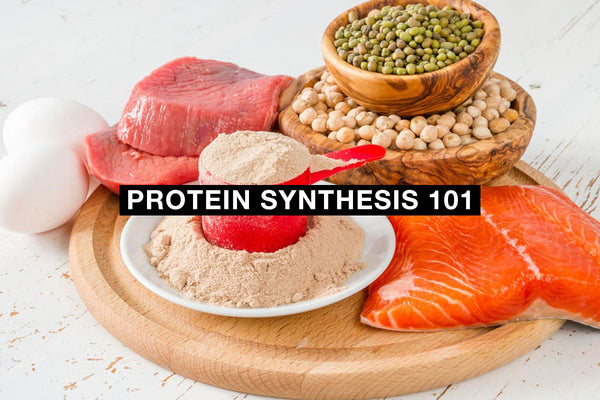When it comes to lifting weights, building muscle, and getting results, you’ve probably heard the phrase “protein synthesis” thrown around a time or two.
You know it sounds important, but you might not really understand what it does or how it works.
That’s where this guide comes in.
Today, we’re going to give you a primer on all things protein synthesis.
So, let’s start with the basics…
What is Protein Synthesis?
In simple terms, protein synthesis is the process by which cells make proteins.
Individual amino acids are linked together in a chain (held together by peptide bonds), and when enough amino acids are added together in sequence a protein is formed.
Each protein in the body has its own unique amino acid composition and structure.
The body uses these various proteins for a number of things including:
Now, it’s worth mentioning that the body is in a constant state of protein synthesis and protein breakdown as worn out, damaged, and/or old structural components are torn down and replaced with newer protein molecules.
Fueling this protein-building process are amino acids (the building blocks of protein), which are obtained through the food and supplements (protein powder, BCAA supplements, etc.) we eat.
If there is a shortage in any one of the essential amino acids, protein synthesis can be stunted.
Since most of you reading this are interested in the role that protein synthesis plays in muscle recovery and growth, that’s what we’ll focus on.
This brings us to the next topic of discussion...
How Protein Synthesis Works
Within muscle cells, there are two key enzymes:
- mTOR -- mechanistic target of rapamycin
- AMPK -- AMP-activated protein kinase
mTOR is activated with resistance training (as well as the consumption of dietary protein/amino acids), while AMPK is activated during steady state cardio.
Why is this important?
mTOR is the biological pathway that stimulates protein synthesis, and ultimately muscle growth.
mTOR also upregulated ribosomal biogenesis. Ribosomes are organelles within each cell that serve as the protein-making factories. The more ribosomes you have in a cell, the greater capacity you have to build proteins -- thereby supporting muscle recovery and growth.
Therefore, if we want to maximize protein synthesis in the body, we need to focus on those factors that stimulate mTOR.
AMPK acts as the “energy sensor” of the cell and when it is triggered, it upregulates mitochondrial biogenesis. Mitochondria are the “power plants” within cells that generate ATP to be used for energy.
Another interesting fact about AMPK is that it has the ability to blunt mTOR signaling, meaning it can reduce the signal to ramp up protein synthesis.
Now, when ATP levels are high (meaning our cells have lots of available energy), AMPK signaling is blunted. Calorie intake plays a huge part in this equation as our bodies use the calories we eat to produce ATP. So, low calorie intake leads to low energy production and vice versa.
This is also part of the reason it's harder to build muscle when you’re dieting on low calories -- AMPK signaling is higher (meaning the body is craving energy), which blunts mTOR signaling.
Protein synthesis, in addition to requiring sufficient amounts of amino acids, also requires ATP.
If AMPK is activated, that means ATP levels are low, and as a result protein synthesis will be suppressed.
Now, let’s look at some strategies you can implement to boost protein synthesis.
How to Boost Protein Synthesis
If you want to get the kind of results like our transformation challenge winners, you’ll need to maximize protein synthesis.
Here are three easy things you can do starting right now to enhance muscle protein synthesis:
#1 Consume Protein
To effectively synthesize protein, your body needs a steady supply of amino acids, namely the essential amino acids (EAAs), found in Protein Powders
Essential amino acids are amino acids that the body cannot create on its own and must obtain through the diet.
With sufficient amounts of these amino acids, along with enough carbohydrate, the body can synthesize the other amino acids it needs (non-essential and conditionally essential amino acids).
Not consuming sufficient amounts of essential amino acids bottlenecks protein synthesis, which impairs recovery, repair, and growth.
To help ensure active individuals consume enough protein and amino acids, it can be helpful to supplement with protein powders and EAA/BCAA supplements.
These supplements offer highly bioavailable nutrition that is effortless to prepare and tastes delicious!
#2 Lift Weights
In addition to protein ingestion, intense exercise, like resistance training, also ramps up protein synthesis in the body.[1,2]
Now, the thing to remember is that while exercise does kickstart protein synthesis, it also stimulates protein breakdown. Not consuming protein following training and/or exercising for too long without eating results in protein breakdown exceeding protein synthesis, which can lead to muscle loss.
This is why it’s important to properly fuel up before and after training -- so your body has enough “raw materials” to support the muscle recovery and growth processes.
Interestingly, research shows that consuming whey protein after a bout of resistance training leads to greater spikes in protein synthesis than is observed with either protein ingestion or resistance training on its own.[1,2]
This is one of the biggest reasons it’s recommended to have a post-workout protein shake when your training session is over.
#3 Recover Smart
So often, the focus is on “crushing” a workout, as it’s commonly believed that muscle is built in the gym.
However, resistance training merely provides the stimulus for muscle growth (see point #2). It is the minutes, hours, and days following intense training that protein synthesis really ramps up and rebuilds muscle, making it bigger and stronger.
In other words, you need to take your recovery as seriously as you do your training. It is only by giving your body ample time to recover (as well as adequate nutrition) that you will gain strength and see the results from your efforts in the gym.
Failure to take recovery seriously and training too much can actually lead to excessive protein breakdown. So, make sure to push hard in the gym, but also make sure you give your body enough time to recuperate!
Satisfy Protein Needs with 1UP Nutrition
If you want to promote greater protein synthesis, 1UP Nutrition is here to help.
We offer an extensive array of premium-quality protein powders and EAA/BCAA supplements to help you meet your daily protein and amino acid requirements.
These supplements support recovery by supplying your body with all the amino acids it needs to fuel protein synthesis to help you repair damaged muscle tissues and grow stronger, more resilient.
References
- Macnaughton, L. S., Wardle, S. L., Witard, O. C., McGlory, C., Hamilton, D. L., Jeromson, S., Lawrence, C. E., Wallis, G. A., Tipton, K. D.. The response of muscle protein synthesis following whole‐body resistance exercise is greater following 40 g than 20 g of ingested whey protein. Physiol Rep, 4 ( 15), 2016, e12893, doi: 10.14814/phy2.12893
- Atherton PJ, Smith K. Muscle protein synthesis in response to nutrition and exercise. J Physiol. 2012;590(5):1049-1057. doi:10.1113/jphysiol.2011.225003





